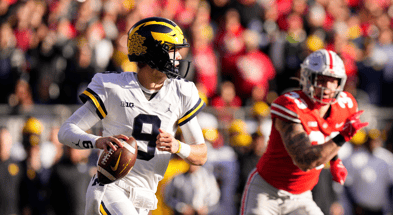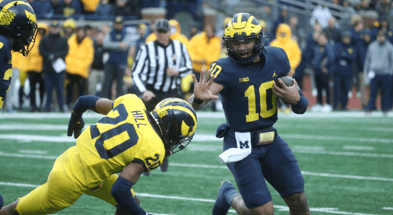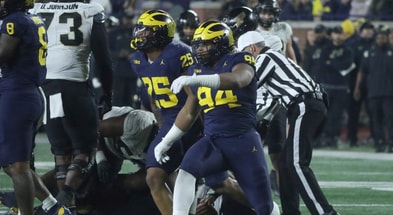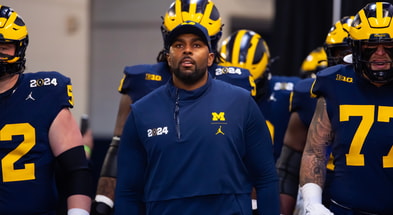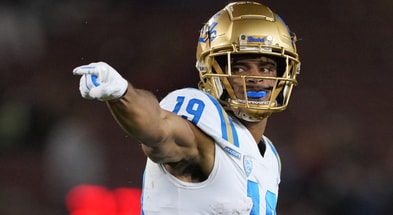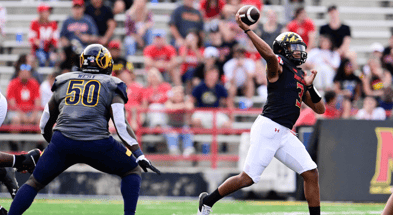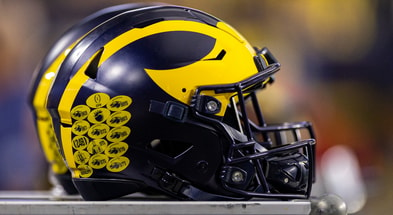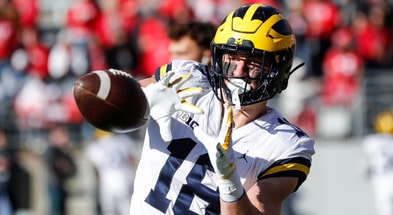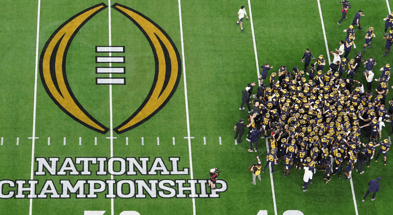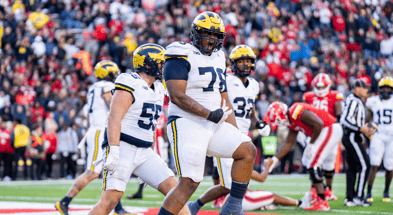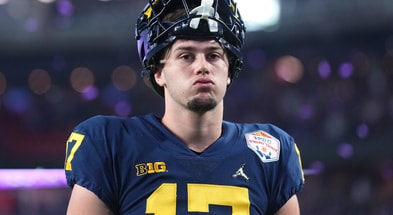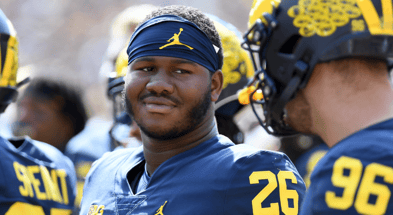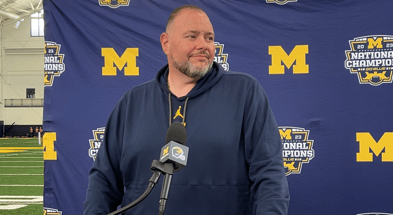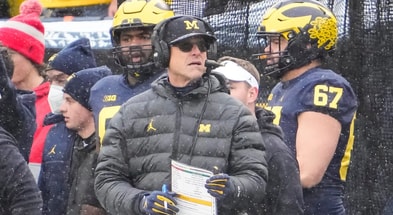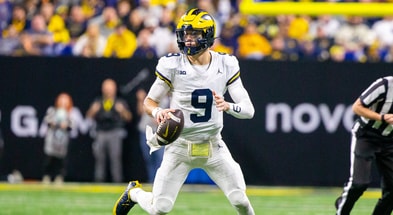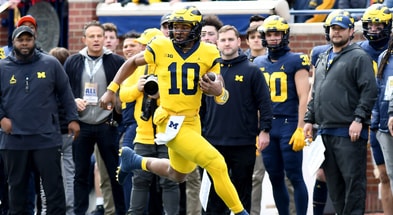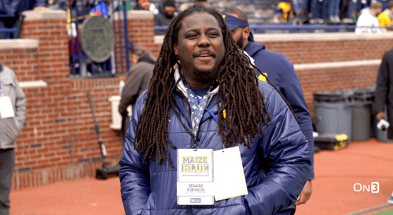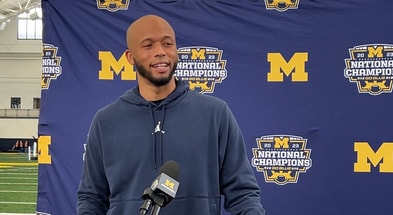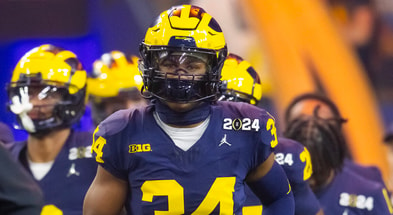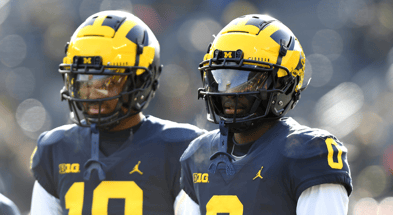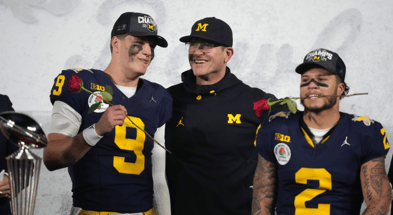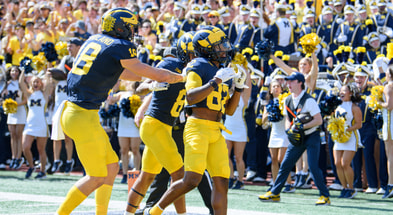Q&A: Fans Meet Idols founder Steve Kennedy helping Michigan athletes profit off NIL
Fans Meet Idols founder Steve Kennedy spoke with TheWolverine.com this week to discuss NIL and how his direct-to-fan marketplace is changing the way student-athletes view fan monetization. Michigan currently has 13 student-athletes with storefronts available on his platform.
Kennedy, an Atlanta-based entrepreneur, established FMI in July 2020 to help student-athletes profit off their name image and likeness by creating a place for them to offer products, digital goods and appearances to fans. He has founded five different companies since 2004 in a mission to provide various solutions throughout college athletics.
How did the ideologies behind previous companies help form Fans Meet Idols?
Kennedy: “My previous companies always offered some type of a recruiting or compliance solution to the athletic department. At that particular time, it was trying to make the relationship between a coach and a recruit be as optimal as possible given the technologies that were available five, 10, 15 years ago. […] The relationship moving from face-to-face visits and phone calls to now technology winds up being a big part of building that relationship was really what I’ve always gravitated to in trying to provide a technology to the schools to help the coaches build that relationship and stay compliant. So, that was a really strong basis that when we saw name, image and likeness coming down the pipe, we concentrated on trying to make the relationship between a student-athlete and the fan be as optimal as possible.
“When you think about name, image and likeness, you can really — for the sake of over simplifying it — draw a line right down the middle and say there are two ways that student athletes can make money. One is to go get brand endorsement deals, which aren’t really that plentiful and are inequitable when it comes to who’s getting them and the criteria they have to meet in order to even qualify for getting interest. The other is going to be fan access. We knew that not every kid was going to get a brand endorsement deal, but the good news is every student-athlete has fans. They’ve got family. They’ve got friends. Maybe they’re a hometown hero. Our objective was to make it really, really easy to enable a student-athlete to generate NIL income by building a shop that they could direct everybody to, make some money and stay compliant.”
What’s been biggest evolution since the FMI launch?
Kennedy: “Most people have a tendency to associate name, image and likeness with brand endorsement deals. The number one thing that we had to punch through is to signal to these student-athletes that there is another way for you to make money from name, image and likeness and that is to give fans easy access to you and monetize that relationship. A lot of times, we’ll get in front of a student-athlete and if they haven’t had their phone ring with a brand endorsement deal yet, a lot of times these kids have given up. […] We’re not trying to be a matchmaker between you and a brand endorsement deal. There are hundreds of companies already out there doing that. This is a different conversation we’re trying to have which is let’s go do fan monetization, stand up a shop and give fans a way to spend money on you.”
When you have these conversations, does the student-athletes’ mindset change quickly?
Kennedy: “It’s instantaneous. You’re going to either find an athlete that’s already began to experiment with fan monetization, or you’re going to find a student-athlete that hasn’t. The ones that have — those are some of our favorite conversations because we can say, ‘It looks like you’ve already got a merch store over here, so you get it. How about we link to that existing merch store and look at all of these additional ways we can give fans the ability to spend money on you?’ Those conversations go by super fast.
“When you get the other type of student-athlete who hasn’t experimented or doesn’t know about the whole fan monetization angle, it only takes a couple seconds to get them under the impression of it.”
What’s your take on NIL in general and how it’s impacting college sports overall?
Kennedy: “This couldn’t be any better for student-athletes. I think the challenge is that there isn’t a lot of guidance for student-athletes. Remember when you were 17 to 22 years old? I do. Remember what it might be like being 17 to 22 years old and then you have two full-time jobs. You’re a student first, athlete second. NIL is a distant third. If you’re fortunate enough to be big-time enough to have an agent or a guardian or someone helping you out, which is only really the top two or three percent of all 700,000 student-athletes that are out there, then you’re good. But what about the other 697,000 student-athletes that don’t have somebody to help them out with it? It’s good, but there’s just not a lot of guidance.
“Student-athletes want two things: easy and comfortable. The whole premise of Fans Meet Idols is instead of trying to go open up 10 different accounts across three different disciplines of products, digital goods and appearances, let’s just stand up one storefront for you. Now you’re dealing with one place to send all of your fans, one commission rate and one compliance reporting responsibility. From a promotional standpoint, we’re helping them continue to tell fans they’re open for business and teach them the marketing tactics of what it’s like to be an entrepreneur.”
What are the long-term goals here? What does this platform become?
Kennedy: “The long-term part of this is to make it really easy for student-athletes to self service, stand up a storefront and begin taking orders from fans within 10 minutes. Right now, we’re in a world where everything is kind of new and some hand-holding has to take place to get these student-athletes onboarded and taking orders. So, I think once we get a little practice and a couple seasons under our belt — and people realize this is a thing — then this becomes a lot faster and a lot more student athletes can do it themselves. We’re kind of stuck in this world right now where it’s much more full service and hand-holding versus going to a future where it’s going to be self service and they can do it themselves without any assistance.”
New storefronts just went up for the Green twins. How did those talks go, and what should Michigan fans expect next?
Kennedy: “Our access to student-athletes has been through a couple of different channels. One of them has been just straight direct-to-athlete, where we’re contacting them and seeing if they’d be interested in fan monetization. There are other tactics in communicating with student athletes. The way we got to the Green twins is through their agent. Another tactic that we have is essentially building relationships with agents who have influence over their entire client roster. They love the idea of fan monetization because usually an agent is responsible for trying to go be matchmaker between brand endorsement deals and athletes. Usually, fan monetization is a blind spot for them.
“The moment we can get in front of an agent and say we can create a storefront for your entire client roster individually and begin taking orders from fans, agents realize we’re not a threat to their business. If anything, we’re enabling an additional revenue line that was a blind spot for them with NIL.”
Michigan storefronts
Michigan football
Michigan volleyball
Michigan tennis
Michigan field hockey
Michigan gymnastics
Search “Michigan” here to see all the Wolverines available on Fans Meet Idols.
